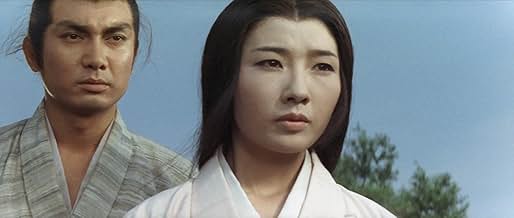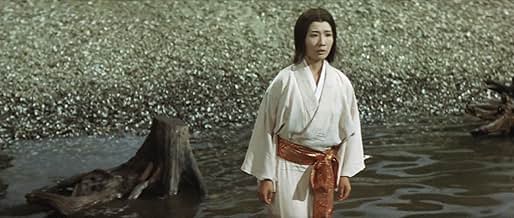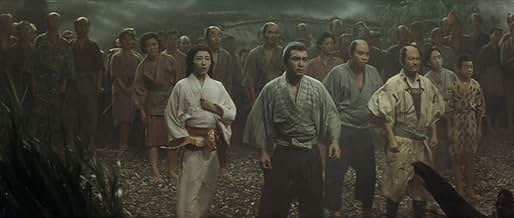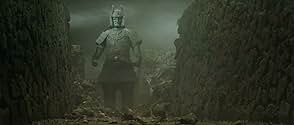CALIFICACIÓN DE IMDb
6.4/10
1.1 k
TU CALIFICACIÓN
Agrega una trama en tu idiomaGiant statue exacts revenge upon those who conquer its worshippers.Giant statue exacts revenge upon those who conquer its worshippers.Giant statue exacts revenge upon those who conquer its worshippers.
- Dirección
- Guionista
- Elenco
Jutarô Kitashiro
- Genba Onikojima
- (as Jutarô Hôjô)
- Dirección
- Guionista
- Todo el elenco y el equipo
- Producción, taquilla y más en IMDbPro
Opiniones destacadas
Return of Daimajin is the second film in the trilogy about the great demon god that combines elements of period dramas and giant monster movies. In this shortest movie of the series, an evil lord menaces, destroys and conquers two neighbouring villages when farmers seek refuge from him in these peaceful places. The survivors of the invasion retreat to an island on a lake where Daimajin's statue is hidden in a cave. As the lord destroys the statue, the demon god comes to life to save the villagers from the murderous dictator.
This movie convinces on numerous levels and has aged very well. First and foremost, this film clocks in at only seventy-nine minutes and entertains from start to finish with swift pace.
Up next, the locations have been chosen particularly well and bring ancestral Japan back to life. The scenic mountains and fields, the colourful villages and fortifications as well as the mysterious island on the lake are quite memorable.
The characters are also very intriguing. The antagonist is particularly brutal, pitiless and selfish and will make viewers root against him. The protagonists shine with courage, perseverance and resilience and will make viewers empathize with them. Even the side characters have interesting emotional characteristics to offer. Needless to say that the skilled acting performances match the wonderful script.
The final twenty minutes of the movie are particularly spectacular. The titular monster goes on an impressive rampage as the simple yet efficient special effects shine brightly in this movie. The architecture of the villages, the armour of the monster and the costumes of the villagers have all been crafted with great detail. The destruction of infrastructures looks impressive and has been prepared very skillfully and filmed very precisely.
The technical aspects of this movie are very strong in general. Even decades later, the calm, organized and precise camera work stands out very positively if compared to numerous action movies with dizzying shaky camera sections. The authentic, detailed and intense sound effects in the destructive finale will send shivers down the spine of any cineast. The excellent classical music soundtrack by skilled veteran Ifukube Akira is another noteworthy highlight and makes an intense movie even more emotional.
As you can read, Return of Daimajin is even a slight improvement over its critically acclaimed genre-breaking predecessor Daimajin. This sophomore entry is even more detailed, organized and precise as it turns out being a great example of how to make a timeless movie with a limited budget but much professionalism. The two movies aren't directly related to each other, so you could watch Return of Daimajin as a standalone feature. Anyone who likes period dramas and monster movies should call a copy of this movie her, his or their own. I would suggest picking up the wonderful boxed set by Arrow Media with all three films and plenty of interesting bonus material.
This movie convinces on numerous levels and has aged very well. First and foremost, this film clocks in at only seventy-nine minutes and entertains from start to finish with swift pace.
Up next, the locations have been chosen particularly well and bring ancestral Japan back to life. The scenic mountains and fields, the colourful villages and fortifications as well as the mysterious island on the lake are quite memorable.
The characters are also very intriguing. The antagonist is particularly brutal, pitiless and selfish and will make viewers root against him. The protagonists shine with courage, perseverance and resilience and will make viewers empathize with them. Even the side characters have interesting emotional characteristics to offer. Needless to say that the skilled acting performances match the wonderful script.
The final twenty minutes of the movie are particularly spectacular. The titular monster goes on an impressive rampage as the simple yet efficient special effects shine brightly in this movie. The architecture of the villages, the armour of the monster and the costumes of the villagers have all been crafted with great detail. The destruction of infrastructures looks impressive and has been prepared very skillfully and filmed very precisely.
The technical aspects of this movie are very strong in general. Even decades later, the calm, organized and precise camera work stands out very positively if compared to numerous action movies with dizzying shaky camera sections. The authentic, detailed and intense sound effects in the destructive finale will send shivers down the spine of any cineast. The excellent classical music soundtrack by skilled veteran Ifukube Akira is another noteworthy highlight and makes an intense movie even more emotional.
As you can read, Return of Daimajin is even a slight improvement over its critically acclaimed genre-breaking predecessor Daimajin. This sophomore entry is even more detailed, organized and precise as it turns out being a great example of how to make a timeless movie with a limited budget but much professionalism. The two movies aren't directly related to each other, so you could watch Return of Daimajin as a standalone feature. Anyone who likes period dramas and monster movies should call a copy of this movie her, his or their own. I would suggest picking up the wonderful boxed set by Arrow Media with all three films and plenty of interesting bonus material.
Released in April 1966, soft pacing was the only particular issue holding back the blend of fantasy and horror that was 'Daimajin.' I quite enjoyed it, and I've been looking forward to finishing Daiei's trilogy. While notably bearing a similar broad plot structure - a forlorn people appeal to Daimajin to save them from the cruel warlords who run roughshod over their land - this is no inherent mark against this sequel of a few months later. Thankfully, moreover, I think 'The return of Daimajin' does not struggle with the same pacing that hampered its predecessor, and the plot moves steadily within the diminutive runtime of seventy-nine minutes. With all this in mind we get more of that fantasy we want in a rich period setting, over top of an unexpectedly engrossing story, and the result is a really great time!
Alongside some beautiful filming locations, every element of the picture is filled with outstanding detail: gorgeous sets, terrific costume design, and lovely hair and makeup; smart and enticing lighting, vivid cinematography, and impeccable sound design; superb stunts, practical effects, and action sequences. Special effects are very judiciously and mindfully employed, and therefore look better than they have any right to. Writer Yoshida Tetsuro gives us a screenplay of a splendidly compelling plot and earnestly gripping, flavorful scenes; Misumi Kenji's direction sustains undeniable vibrant energy and tension as the minutes tick by. The cast give strong performances of able nuance and emotional depth befitting the substantial drama that underlies the jidaigeki roots and the fantasy overtones. Composer Ifukube Akira provides a robust, stirring score, in some measure recalling the thunderous chords of his most famous work in the Godzilla franchise, that deftly complements the proceedings at any time.
From top to bottom, the movie is far more skillfully made than one might suppose of something that lacks the same visibility as some other contemporary fare - and really, maybe altogether more skillfully made than some such fare. And with all this well in mind, it doesn't even matter that the titular being has a fairly small presence in his own film. While very sparingly playing a part in the saga throughout, we don't specifically see Daimajin until we're within the last twenty minutes. Be that as it may, the action is so exciting, and the drama so raptly absorbing - and decidedly dark - that it was almost unnecessary for the entity to be involved at all. If that doesn't speak to how marvelously solid 'The return of Daimajin' is, then I don't know what does, and in all honesty I think this sequel actually happens to be superior to its forebear. Free of the same single shortcoming, and just as carefully crafted in every regard if not more so, this is genuinely fantastic!
The practical effects of yesteryear will always be preferable and almost always look better than the most state-of-the-art computer generated imagery, and so this flick holds up astonishingly well. I assumed I'd enjoy it, but I'm positively thrilled with just how good it turned out to be, with nice little touches all throughout even to the end. As a matter of personal preferences it won't appeal to all, but I very much like 'The return of Daimajin' and I'm pleased to give it my very high recommendation!
Alongside some beautiful filming locations, every element of the picture is filled with outstanding detail: gorgeous sets, terrific costume design, and lovely hair and makeup; smart and enticing lighting, vivid cinematography, and impeccable sound design; superb stunts, practical effects, and action sequences. Special effects are very judiciously and mindfully employed, and therefore look better than they have any right to. Writer Yoshida Tetsuro gives us a screenplay of a splendidly compelling plot and earnestly gripping, flavorful scenes; Misumi Kenji's direction sustains undeniable vibrant energy and tension as the minutes tick by. The cast give strong performances of able nuance and emotional depth befitting the substantial drama that underlies the jidaigeki roots and the fantasy overtones. Composer Ifukube Akira provides a robust, stirring score, in some measure recalling the thunderous chords of his most famous work in the Godzilla franchise, that deftly complements the proceedings at any time.
From top to bottom, the movie is far more skillfully made than one might suppose of something that lacks the same visibility as some other contemporary fare - and really, maybe altogether more skillfully made than some such fare. And with all this well in mind, it doesn't even matter that the titular being has a fairly small presence in his own film. While very sparingly playing a part in the saga throughout, we don't specifically see Daimajin until we're within the last twenty minutes. Be that as it may, the action is so exciting, and the drama so raptly absorbing - and decidedly dark - that it was almost unnecessary for the entity to be involved at all. If that doesn't speak to how marvelously solid 'The return of Daimajin' is, then I don't know what does, and in all honesty I think this sequel actually happens to be superior to its forebear. Free of the same single shortcoming, and just as carefully crafted in every regard if not more so, this is genuinely fantastic!
The practical effects of yesteryear will always be preferable and almost always look better than the most state-of-the-art computer generated imagery, and so this flick holds up astonishingly well. I assumed I'd enjoy it, but I'm positively thrilled with just how good it turned out to be, with nice little touches all throughout even to the end. As a matter of personal preferences it won't appeal to all, but I very much like 'The return of Daimajin' and I'm pleased to give it my very high recommendation!
Daiei Studios' Return of Daimajin is the first sequel to the movie featuring the giant stone god. In this plot, villagers defy an evil warlord's order to turn over one of their protectors, Lord Juro (Kôjirô Hongô), and end up seeing their people being brutally attacked by the warlord and his soldiers. As a result, the villagers pray upon Daimajin, the great stone god, to fight for them.
The plot, I thought, was not as suspenseful and solid as the original movie, as it has more of a general "turn over your hero to us or we'll screw your village over" story line. But, there is plenty of sword-wielding and good guy vs. bad guy action to keep the film engaging, and the nastiness of the villains will make you want to root for the god to awaken and teach them a lesson they'll never forget - showing them that they shouldn't mess with the faithful.
The acting was pretty good, cinematography was brilliant and special effects were neat. Also, you really can't go wrong having the great Akira Ifukube score the music soundtrack to this film, though, much of the music is reused or reworked from the scores of past Toho films.
Overall, it's a rather entertaining feature that fans of Japanese sci-fi/fantasy films could enjoy.
Grade B-
The plot, I thought, was not as suspenseful and solid as the original movie, as it has more of a general "turn over your hero to us or we'll screw your village over" story line. But, there is plenty of sword-wielding and good guy vs. bad guy action to keep the film engaging, and the nastiness of the villains will make you want to root for the god to awaken and teach them a lesson they'll never forget - showing them that they shouldn't mess with the faithful.
The acting was pretty good, cinematography was brilliant and special effects were neat. Also, you really can't go wrong having the great Akira Ifukube score the music soundtrack to this film, though, much of the music is reused or reworked from the scores of past Toho films.
Overall, it's a rather entertaining feature that fans of Japanese sci-fi/fantasy films could enjoy.
Grade B-
Return of Daimajin (1966) is a Japanese gem I recently watched on a random streaming service. The storyline follows a small town that is getting conquered by an evil dictators army. A young lady escapes and flees to a sacred temple and prays to their god to come save them. When the young lady is captured and made an example of the village god returns one last time to save the village.
This movie is directed by Kenji Misumi (Shogun Assassin) and stars Kôjirô Hongô (Satan's Sword), Shiho Fujimura (Zatoichi's Cane Sword), Tarô Marui (Fangs of Vengeance), Takashi Kanda (The Devil's Ballad) and Kôji Fujiyama (Bullet Train).
These are all a nice mix of samurai genre and monster movie, even if the monster doesn't appear until there's about 25 minutes left in the movie. The action scenes are very well choreographed and take place in some fun settings. I always love a good samurai sword fight scene. The effects on the monster is essentially a costume, mask and makeup but it works. The attack on the village at the end is good as is the final scene to conclude the series.
Overall this series is fairly consistent and worth watching for horror fans who enjoy samurai movies. I would score this a 6/10 and recommend giving it a try.
This movie is directed by Kenji Misumi (Shogun Assassin) and stars Kôjirô Hongô (Satan's Sword), Shiho Fujimura (Zatoichi's Cane Sword), Tarô Marui (Fangs of Vengeance), Takashi Kanda (The Devil's Ballad) and Kôji Fujiyama (Bullet Train).
These are all a nice mix of samurai genre and monster movie, even if the monster doesn't appear until there's about 25 minutes left in the movie. The action scenes are very well choreographed and take place in some fun settings. I always love a good samurai sword fight scene. The effects on the monster is essentially a costume, mask and makeup but it works. The attack on the village at the end is good as is the final scene to conclude the series.
Overall this series is fairly consistent and worth watching for horror fans who enjoy samurai movies. I would score this a 6/10 and recommend giving it a try.
Basically this is the "Daimajin" plot done with a few subtle differences. There are some interesting Christian motifs here; parting of the Red Sea, crucifixion... that I wasn't expecting being that Majin is a "kami". Visually it is very satisfying. Misumi went on to direct the incredible "Kozure Okami" or "Lone Wolf with Cub" movies. Daimajin has some interesting parallels with "King Kong". It's always a woman who ultimately commands the Majin with her prayers and tears.
¿Sabías que…?
- ConexionesFollowed by Daimajin gyakushû (1966)
Selecciones populares
Inicia sesión para calificar y agrega a la lista de videos para obtener recomendaciones personalizadas
Detalles
- Tiempo de ejecución
- 1h 19min(79 min)
- Mezcla de sonido
- Relación de aspecto
- 2.35 : 1
Contribuir a esta página
Sugiere una edición o agrega el contenido que falta





























